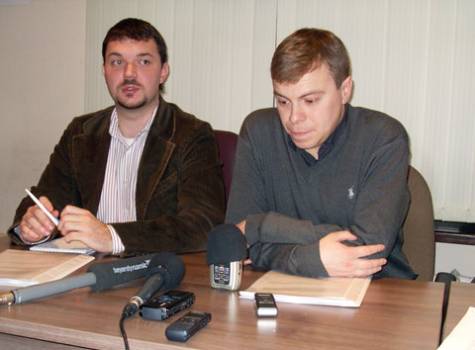Uladzimir Labkovich: “Bialiatski’s case started with a warning, issued to him by General Procuracy for activities on behalf of an unregistered organization”
On 15 October the European
Commission for Democracy through Law (Venice Commission) produced a special
report "On the conformity with the universal human rights standards of
Article 193-1 of the Criminal Code on the rights of non-registered associations
of the Republic of Belarus”. The uniqueness of this instrument lies in the fact
that it was the first time when this authoritative legal commission considered
only one article in a country’s law.
On 14 November Aliaksei Shein, coordinator of the campaign "The Right to Faith"
emphasized at the press-conference on this issue that since the introduction of
Article193.1 (illegal organization of activity of public associations,
religious organization or foundation, or participation in their activities) in the
Criminal Code in 2006, criminal proceedings had been brought against 18
persons. As far as the vast majority of non-governmental organizations work in Belarus without
registration, which is almost impossible to obtain, tens of thousands of their
members are living under a real threat of criminal prosecution.
A peculiarity of the previous year was that for the first time such warnings
were issued not only to political and civil activists, but also to religious
leaders, especially members of Protestant denominations. As stressed by Aliaksei
Shein, in 2010 such warnings were issued to eight Protestant ministers.
The importance of the conclusion of the Venice Commission about the illegal
nature of Article 193.1 of the Criminal Code in this moment was stated by the
member of the Council of Human Rights Center "Viasna" Uladzimir
Labkovich. He recalled that the case against “Viasna” and its Chairman, Ales
Bialiatski, started with an official warning about the inadmissibility of
activities on behalf of an unregistered organization, issued to him by General Procuracy.
Human rights defenders don’t rule out that on Wednesday, when the hearings on
this case continue, Bialiatski can be presented new charges, under Article
193.1, in addition to the present ones, which are of economic nature.
Human rights activists welcomes the fact that
such an influential organization expert at the Council of Europe, an associate
member of which is the Republic of Belarus, recognized Article 193.1 as
contrary to the Covenant on Civil and Political Rights and the international
obligations of Belarus. The very existence of this article in the
legislation suppresses civil society and inhibits its development. It is
inadmissible to draw people to criminal liability for activities in which there
is no guilt and crime.
A representative of the Assembly of Democratic NGOs, coordinator of the
campaign "Stop 193.1" Siarhei Lisichonak said that today the English
variant of the conclusion and the Russian translation would be sent to the authorities
who made decisions or can influence those who may decide to repeal the infamous
article. Among them there are the House of Representatives and the Soviet of
the Republic, the Presidential Administration, the Information and Analysis Center under the President, the KGB and
other agencies.
"From now on we start a number of events which will be a result of the
cooperation of non-governmental organizations and representatives of religious
communities and will be aimed at minimizing the consequences of Article 193.1
for the Belarusian society", emphasized Siarhei Lisichonak.
Answering journalists’ questions, the member of the Council of the Human Rights
Center "Viasna" Uladzimir Labkovich admitted that "it is
possible that the government will pretend there is no such a document even
after receiving the Opinion of the Venice Commission. “However, the people who
take this and similar decisions should know that Belarus violates the international
obligations assumed voluntarily, and that they will have to answer for it
someday.”
______________________________
The Venice Commission is an advisory body on constitutional law, established by
the Council of Europe in 1990. The main form of work of the Commission is the
analysis of laws and legislation concerning issues of constitutional law,
including standards for elections, minority rights, etc. The Commission's
conclusions are widely used as a reflection of the PACE "European
standards of democracy."


















